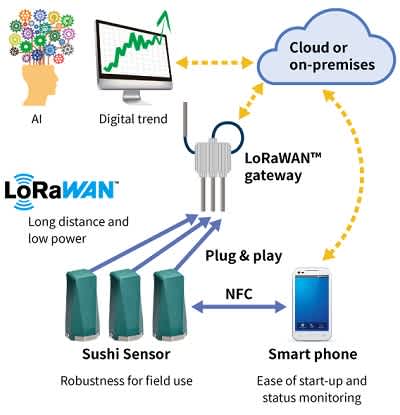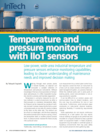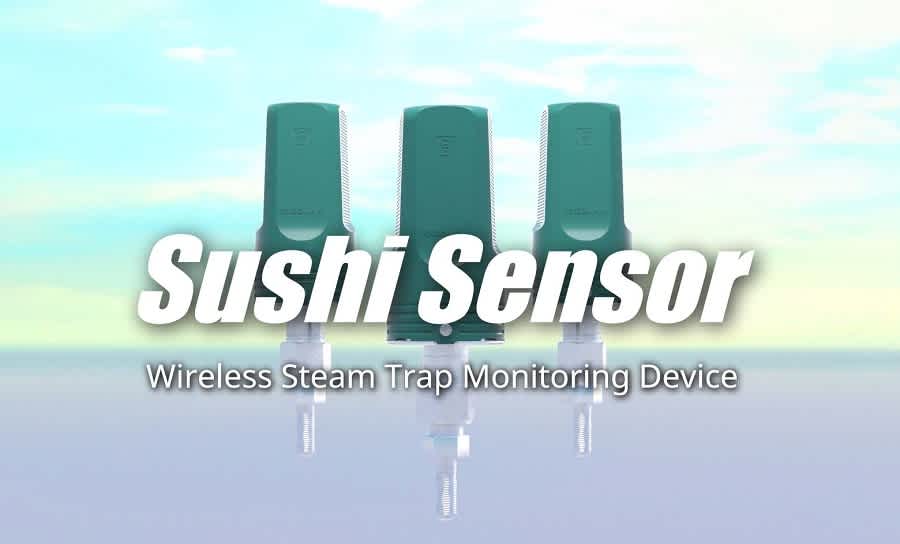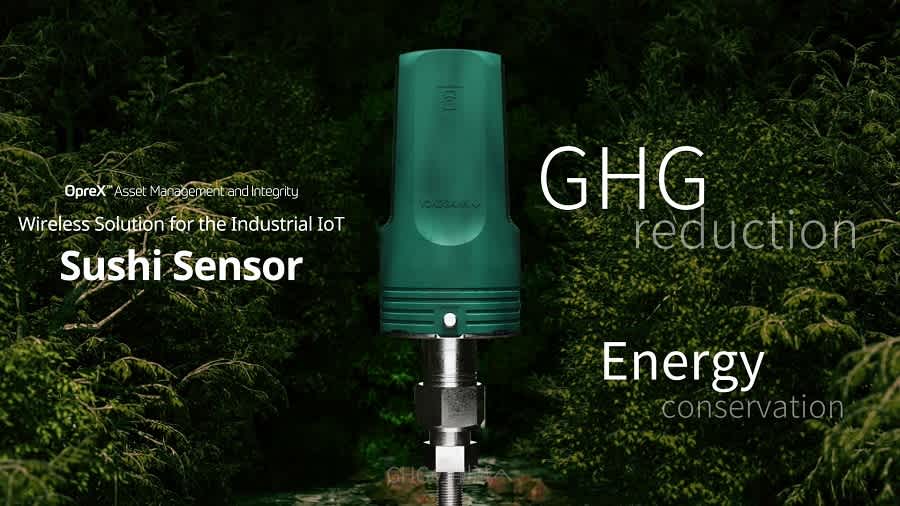Upcoming Events
-
Event | Award Jun 2, 2025 - Jun 2, 2026 Yokogawa’s Wireless Steam Trap Sensor Wins Silver in Control Engineering 2025 Product of the Year Awards
 What Are Sushi Sensors and IIoT Wireless Monitoring Sensors?
What Are Sushi Sensors and IIoT Wireless Monitoring Sensors?
Yokogawa’s line of Sushi Sensors offers field-proven technologies capable of handling the toughest conditions or application challenges, helping users maximize efficiency, pinpoint possible equipment issues more accurately, and decrease downtime.
-
XS110A Wireless Pressure Sensor - Wireless Pressure Monitoring
Wireless Pressure Monitoring Module
-
Wireless Temperature Sensor - Wireless Temperature Monitoring
Wireless Temperature Sensor
-
Wireless Vibration Sensor - Wireless Vibration Monitoring System
A Wireless Vibration Sensor
-
Wireless Steam Trap Sensor
This product acts as a battery-powered wireless steam trap sensor, and it is suitable for Industrial IoT (IIoT) applications. Wireless Steam Trap Sensor detects the condition of a steam trap by its acoustic sensor and temperature sensor.
Details
What Is the Benefit of Sushi Sensors?
 Achieve total Plant Asset Management (PAM) with Condition Based Maintenance (CBM) to drive productivity with reliable and resilient wireless solutions for industrial loT.
Achieve total Plant Asset Management (PAM) with Condition Based Maintenance (CBM) to drive productivity with reliable and resilient wireless solutions for industrial loT.
Monitoring and maintaining diverse equipment in the field is an essential part of day-to-day plant operation. From the acquisition and quantification of measurement data to data storage systems, everything must configure seamlessly to ensure accuracy and reliability.
With Yokogawa’s line of Sushi Sensors, users have can easily solve such networking and connectivity issues. The compact, lightweight, battery-powered sensors are waterproof, dustproof, and explosionproof, making them the ideal choice for hazardous areas. They also meet LoRaWAN standards, enabling long-distance communication of up to 1 km so users can identify equipment conditions via cloud trend monitoring from anywhere in the plant.
What Is a Sushi Sensor?
 Named after sushi, a hand-pressed traditional Japanese food that combines rice with various toppings, Yokogawa’s Sushi Sensors are industrial loT wireless solutions.
Named after sushi, a hand-pressed traditional Japanese food that combines rice with various toppings, Yokogawa’s Sushi Sensors are industrial loT wireless solutions.
- Sushi is easy to eat. A Sushi Sensor is easily installed.
- Professionals prepare sushi. A Sushi Sensor is a robust, finely-tuned product.
- Sushi has a variety of numerous toppings. The Sushi Sensor has a variety of uses (pressure, temperature, and vibration) with new technologies constantly in development.
Resources
Maintaining the reliable performance of a furnace fan allows operators to avoid wasting large batches, which sometimes require days of heat-treat processing.
Prevent costly downtime and process equipment failures with real-time pressure monitoring. Yokogawa’s Sushi Sensor is the optimal choice for industries depending on bottled gas in essential procedures.
Significantly reduce downtime, improve heat exchanger efficiency, and reduce steam wastage with Yokogawa’s Wireless Steam Trap Sensors.
Yokogawa’s Sushi temperature sensor is a cost-effective, reliable, long-range wireless communication for monitoring and recording to boost reliability, and also able to configure the network with redundant gateways for chemical manufacturers.
Vertical farming is an emerging solution to the existing challenges of rising food demands, dwindling arable land, and climate instability. Yet, with innovation comes complexity. Discover how Yokogawa, in collaboration with a leading vertical farming end-user, addresses obstacles that threaten product yield and profitability.
Automated wireless vibration monitoring improves safety and exposes rotating equipment (rollers, driers, etc.) conditions in polyester textile production lines.
Automated wireless temperature monitoring at cement plants, lime kilns, and asphalt plants prevents expensive chute clogging issues.
Automated wireless pressure monitoring at a polyolefin facility producing high-density polyethylene and polypropylene prevents costly catalyst contamination and production losses.
This eBook explains why implementing IIoT based digital operator monitoring solutions for autonomous anomaly detection enhances operations.
Asset health monitoring has long been in existence to protect expensive equipment and/or operations from costly, critical, or catastrophic failures, with numerous examples in nuclear, aeronautical, petrochemical, industries and beyond. The costs associated to install the sensors and asset health system way overcome the consequences of not implementing. However, this is not the case in all industries, with all equipment and/or all operations. In many cases equipment is run until failure and then repaired or replaced.
Wireless sensors and the network can reduce expenses
Low-power, wide-area industrial temperature and pressure sensors enhance monitoring capabilities, leading to clearer understanding of maintenance needs and improved decision making.
Low-power, wide-area industrial temperature and pressure sensors enhance monitoring capabilities, leading to clearer understanding of maintenance needs and improved decision making.
Industrial artificial intelligence/machine learning (AI/ML) software and long-range sensors predict maintenance requirements across entire enterprises, increasing productivity and profits.
Downloads
Brochures
- General catalog: A Wireless Solution for the Industrial IoT Sushi Sensor (4.8 MB)
- Sushi Sensor Product Summary (869 KB)
- XS770A Wireless Vibration Sensor / Sushi Sensor Application note (1.7 MB)
- Wireless solution for Industrial IoT (IIoT) Sushi Sensor (1.3 MB)
- Refining Solutions (12.5 MB)
- Preserving Our Water Resources One Drop at a Time (6.5 MB)
Instruction Manuals
- Sushi Sensor Series Software Edition (5.1 MB)
Engineering Tools
- XS550 Temperature Measurement Module (764 KB)
- XS110A Wireless Communication Module (740 KB)
- XS530 Pressure Measurement Module (759 KB)
Videos
The measurement, collection and utilization of equipment data by the Industrial IoT (IIoT) wireless solution “Sushi Sensor” contributes to efficient equipment maintenance and open a new road to a Smart Factory.
In plants, the failure of a steam trap not only diminishes the thermal efficiency of steam, but also poses a risk of damage and accidents in the steam system.
The industrial IoT wireless solution Sushi Sensor visualizes the condition of steam traps and supports secure management.
In plants, the potential for significant steam loss exists due to the failure of steam traps.
The industrial IoT wireless solution, Sushi Sensor, supports energy monitoring by visualizing the condition of steam traps.
Every steam trap failure isn’t just a maintenance issue—it’s an efficiency and sustainability challenge. Unnoticed steam losses lead to wasted fuel, higher CO2 emissions, and increased costs. What if you could catch issues before they escalate?
Join us for an exclusive look at the XS822 Steam Trap Sensor, a breakthrough in wireless monitoring technology. Learn how this solution empowers your steam system to:
- Reduce energy waste and operational losses while advancing sustainability goals.
- Monitor steam traps effortlessly across your plant with LoRaWAN® technology.
- Minimize downtime, save costs, and extend equipment life
Take the first step in turning steam waste into measurable savings!
Looking for more information on our people, technology and solutions?
Contact Us



























